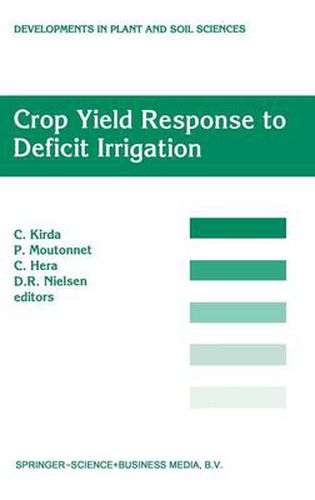Readings Newsletter
Become a Readings Member to make your shopping experience even easier.
Sign in or sign up for free!
You’re not far away from qualifying for FREE standard shipping within Australia
You’ve qualified for FREE standard shipping within Australia
The cart is loading…






This title is printed to order. This book may have been self-published. If so, we cannot guarantee the quality of the content. In the main most books will have gone through the editing process however some may not. We therefore suggest that you be aware of this before ordering this book. If in doubt check either the author or publisher’s details as we are unable to accept any returns unless they are faulty. Please contact us if you have any questions.
With limited water resources to divert for agriculture, innovations aimed at increasing efficient use of irrigation water must be developed. Among the means to survive the consequences of water scarcity and yet to sustain high crop production under irrigated agriculture with decreasing share of water, deficient irrigation programmes are highly valued and their adoption is widely promoted. However, to ensure that the same level of crop yields as in full irrigation can still be achieved with deficient irrigation, experience regarding crop yield response to deficient irrigation programs must be gained. This text discusses general concept and management issues of deficient irrigation practices, covering a range of field crops including cotton, maize, soybean, wheat, sugar cane, and the like, based on five years of field research implemented in 14 countries, in Latin America, Africa, Europe and Asia. Additionally, guidelines are given for experimental methodology and data analysis for evaluating crop yield response to deficient irrigation.
$9.00 standard shipping within Australia
FREE standard shipping within Australia for orders over $100.00
Express & International shipping calculated at checkout
This title is printed to order. This book may have been self-published. If so, we cannot guarantee the quality of the content. In the main most books will have gone through the editing process however some may not. We therefore suggest that you be aware of this before ordering this book. If in doubt check either the author or publisher’s details as we are unable to accept any returns unless they are faulty. Please contact us if you have any questions.
With limited water resources to divert for agriculture, innovations aimed at increasing efficient use of irrigation water must be developed. Among the means to survive the consequences of water scarcity and yet to sustain high crop production under irrigated agriculture with decreasing share of water, deficient irrigation programmes are highly valued and their adoption is widely promoted. However, to ensure that the same level of crop yields as in full irrigation can still be achieved with deficient irrigation, experience regarding crop yield response to deficient irrigation programs must be gained. This text discusses general concept and management issues of deficient irrigation practices, covering a range of field crops including cotton, maize, soybean, wheat, sugar cane, and the like, based on five years of field research implemented in 14 countries, in Latin America, Africa, Europe and Asia. Additionally, guidelines are given for experimental methodology and data analysis for evaluating crop yield response to deficient irrigation.